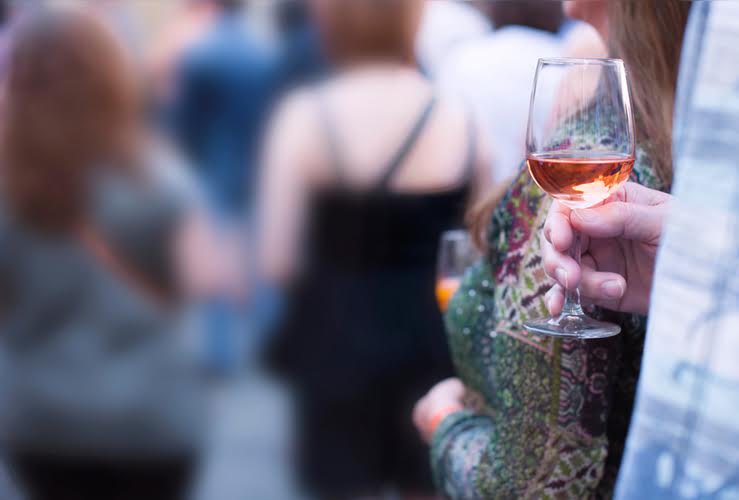7 Things That Inevitably Happen to Your Personal Life When You Get Sober
When I met my husband in 2006 and found out I was pregnant about a year and a half later,...
When I met my husband in 2006 and found out I was pregnant about a year and a half later, I immediately stopped drinking. But I didn’t think twice about starting back up again once the baby came. I saw other moms getting together for wine nights and drinking at birthday parties where their little kids were running around, so that’s exactly how I bonded with them after I had my son. On my way home from work, I’d even get butterflies of anticipation in my stomach thinking about my glass of wine. My husband and I had moved away from everything we knew, so I was trying to make new friends and raise my baby all while handling a new job.
How long after stopping drinking do you feel better?
It’s an opportunity to grow into your bones, and every single crap thing that happens to you on the way only makes you stronger. So now I’m sober, and I have zero choice but to be me in all situations. My biggest fears in life include being in large groups of strange people, standing at parties by myself, and really just people in general. Drunk me didn’t have Sober House to worry if I was alone at a party because drunk me didn’t abide such things. Drunk me didn’t worry if she belonged, or said the right thing, or had to have small talk because drunk me just handled that. If people press that response, I’ll either stare at them and hold an uncomfortable silence (this is enjoyable at some point), or just change the subject.

Beach Towns in Chaos as Memorial Day Weekend Crime Causes Panic
- And you're at greater risk when you try to quit drinking on your own.
- The information we provide while responding to comments is not intended to provide and does not constitute medical, legal, or other professional advice.
- Additionally, more is needed to suppress glutamate, which as mentioned before, causes feelings of stress that set in a few hours after drinking sessions end.
- When women consume even moderate levels of alcohol, their risk for various cancers goes up, including digestive, breast and pancreatic cancer, among other health problems – and even death.
- Dr. Dasgupta said for social and moderate drinkers, participating in a month break won’t make much difference to their bodies.
Your energy will be devoted to getting you going, as opposed to recovering from alcohol. If physical symptoms continue after 11 days of abstinence, seek medical attention. Those persistent symptoms might have some other cause than alcohol withdrawal.
The non-addict partner

Speaking of work, you’ll likely experience increased productivity and concentration at whatever it is you’re doing, whether that be working, studying, or reading. American Addiction Centers (AAC) is committed to delivering original, truthful, accurate, unbiased, and medically current information. We strive to create content that is clear, concise, and easy to understand. As the loved one of someone in recovery, there are ways you can help preserve their recovery and prevent a relapse.
- If you’ve been curious about how to stop drinking alcohol and get sober, you might be wondering where to start.
- Start questioning your drinking today, particularly if alcohol use disorder runs in your family.
- Addiction treatment can be beneficial in helping you learn coping skills, gather insight into any underlying co-occurring issues, and develop relapse prevention methods that can assist you in maintaining long-term sobriety.
- It can therefore be a good choice for long-term maintenance and relapse prevention.
- Often, people drink because they're stressed or anxious, and they think alcohol provides an instant cure.
Days Without Alcohol: Timeline & What to Expect
Thankfully, there have only been a few times when someone at the table hasn’t pointed it out on my behalf and adjusted accordingly. However, when it has happened, I have to speak up to point out that I didn’t drink and I’m not subsidizing their drinking. I have always hated the feeling that I’m putting people out or being difficult. It’s part of the sobriety package, and it’s not necessarily a bad thing. Sobriety can be an incredible way to shed relationships you’ve outgrown as well as find new ones that align with your new values.

Often, people drink because they're stressed or anxious, and they think alcohol provides an instant cure. Of course, not everyone who drinks has a problem, but a break from alcohol can allow people to consider how much they're drinking and https://theillinois.news/top-5-advantages-of-staying-in-a-sober-living-house/ why. It usually takes a month to see the benefits of stopping, but in my experience they become apparent relatively quickly. If you drink in excess, cutting out alcohol for a period of time can help your liver, heart, and body composition.
What Causes Withdrawal?
"I'm very irritated at times. I feel really good about my choice to quit drinking. I have headaches often and I have weird and bad dreams. Every night I dream that I'm having a drink again." While cirrhosis scars from excessive drinking are irreversible, quitting alcohol and leading a healthier lifestyle can help your liver heal from alcohol-related liver disease. The longer an alcoholic stays sober, the better their chances are for long-term sobriety.
- This is due to the changes in their brain chemistry due to their drinking.
- They wrote me beautiful letters of care and love asking me to get sober.
- "Now that most of the physical symptoms have gone away, time to work at staying sober. This is usually where I mess up and drink because I am feeling better and think I can handle it. I know I can't."
- Sometimes the second day can be even harder than the first, because many of the physical symptoms remain, yet that previous excitement around the initial decision not to drink may be wavering.
- For this reason, a recovering alcoholic should stay involved in aftercare options like Alcoholics Anonymous to stay focused on sobriety.
- "I am starting to feel more human. The exhaustion has gone away, and my concentration seems better."
- There are exceptions to this, like if someone alludes to their own struggle with alcohol, and then I might offer up a bit more of my personal experience.
Seek support
- Taking the time to focus on yourself and your mental health is essential for successful recovery.
- If you find yourself in an emotional relapse, try to learn more about how you can practice self-care.
- "My worst withdrawal symptom is that my brain does not seem to work very well. Lots of spelling errors and poor fine-motor skills. I will not even go into the insomnia."
- It may help to pick a quit date, or a day when you choose to discontinue use of alcohol or drugs.
- In my mid-twenties, I could not take a week off of drinking without suffering some gray area between moderate and severe withdrawal symptoms.
- Substance use within unhappy relationships can also become a downward spiral that can be difficult to get out of.
Spending more time with supportive loved ones and planning activities for the entire family can also help you develop a healthier lifestyle and avoid situations in which you would normally drink or use drugs. Post-acute withdrawal syndrome (PAWS) involves experiencing withdrawal symptoms that persist past the detox period. Such symptoms are often related to mood and may include irritability, anxiety, depression, sleep problems, and fatigue. Alcohol is not good for the body, but it can have a severe impact when an individual with AUD starts drinking again. When alcohol enters the body, the brain, heart, liver, and pancreas can all be affected.
(source) I have never felt any effect from taking GABA supplements. If a GABA supplement comes out that changes my mind, I will write about it. Yet the average heavy drinker doesn’t decrease the amount consumed over time. It’s no secret that alcoholics build a frighteningly high tolerance. This fact also adds to the severity of future withdrawal episodes.
